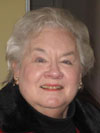| Home | Blog | Ask This | Showcase | Commentary | Comments | About Us | Contributors | Contact Us |

The first rule for live TV: 'Fill! Fill!'COMMENTARY | January 15, 2008Carolyn Lewis, a former PBS reporter, talks of the dreaded 'dead time' and what happens to brave and honest talk show guests who sometimes answer a question by saying, 'I don’t know.' (What happens? They tend to not get invited back.) By Carolyn Lewis When television reporters and pundits stoically bore their share of blame for failing to accurately predict the New Hampshire primary results, as a former television news person myself, I was sympathetic. I know from first-hand experience how the broadcast medium and its incessant demand for gab can entrap even the most seasoned on-air communicator. I was the on-scene PBS reporter for the House Judiciary Committee hearings on the impeachment of President Nixon. Along with the other broadcast media reporters, I sat inside the hearing room while the proceeds were beamed live to control rooms and then into the public's living rooms. It was my job to buttonhole committee members afterward for live interviews. But soon after the hearings began, the chairman announced that everybody – staff, congressmen, reporters, members of the public – would have to immediately leave the premises. As I was walking out I asked one of the congressmen what was going on and he whispered, "Bomb scare." A public explanation had not been forthcoming because it might have caused a dangerous stampede to the exits. Once in the hall outside, my camera crew was already geared up for action, and I was handed a live microphone and an earpiece that connected me to the control room. What I needed at that moment was a quiet pause to collect my thoughts. Instead the producer at the other end of the line, panicked by the prospect of no sound or image to fill the screen, screamed in my ear "Fill! Fill!" I wanted to tell him to shut up, but I was on live and had to maintain a calm (and dignified) exterior. I also had no idea how long I would have to stand there and "fill." As it turned out, my report of a bomb scare was a minor scoop, and since I had covered similar threats, I could dredge up memories of what was the normal security procedure for such events. I remember babbling on about dogs sniffing for explosives until word came that it was safe to file back into the hearing room. I tell this story because as I observe the TV yammering about politics, the words "Fill! Fill!" echo in my mind. In the broadcast medium there is nothing so feared as the silence of dead air. Once a producer assigns a segment to you, the only mandate is to talk and fill the time. After you reveal what you know and time hangs empty and heavy, perhaps under follow-up questions, the temptation arises to go the extra mile and exaggerate or goose up the depth of your knowledge. (Without an editor on hand and time to check my facts, was I accurately reporting how the Capitol security system worked? And what material would have been on hand to fill my standup if that congressman had not offered me the bomb-scare tip? And by the way, what if it had been a real bomb in the room just behind me and not just a scare?) It's a rare reporter/pundit who, in the face of a three-minute time slot, shrugs his shoulders and says, "I don't Know." Since brevity won't fill the allotted minutes and uncertainty is deemed subversive, such a brave and honest guest is unlikely to be invited back. A decent modicum of humility may be too much to expect from the Fox News ranters and their ilk who substitute shouts, sneers and snarls for sweet reason. But the abject fear of pause and silence also affects other television personalities, including distinguished interviewers. For example, when Chris Matthews interrogates a guest and the interviewee tries to take a second to weigh a response, Matthews jumps right in and answers the question himself. Even Charlie Rose does it, maddeningly squashing an interviewee's answers by rendering his own. It can be embarrassing to watch a guest used as a cardboard figure or a punching bag for the host's own pontifications. Guests aren't supposed to appear to be considering their replies because that way lies the dreaded dead air. In consequence, with rare exceptions, political journalism on television rends the air with the rat-a-tat pace of a machine gun, lacking the depth and measured thoroughness an informed public opinion requires. That those who fill the vacant minutes between commercials are sucked into its alluring temptations and its mindless constraints should come as no surprise.
|



